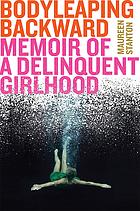
Body Leaping Backward
Memoir of a Delinquent Girlhood
کتاب های مرتبط
- اطلاعات
- نقد و بررسی
- دیدگاه کاربران
نقد و بررسی

May 15, 2019
A prizewinning nonfiction writer's account of a troubled adolescence spent immersed in alcohol, drugs, and crime. Massachusetts native Stanton (English/Univ. of Massachusetts, Lowell; Killer Stuff and Tons of Money: Seeking History and Hidden Gems in Flea-Market America, 2011, etc.) grew up in the shadow of the Walpole State Prison between the "hopeful early days of the 1960s" and the more turbulent ones of the decade that followed. Her own early life was filled with such happy, middle-class childhood staples as tennis lessons, babysitting, and slumber parties. But as she reached adolescence, the quality of her life eroded. Her parents separated and suddenly became part of the emergent "divorce boom." Caught in an economic slump that characterized the early and middle part of the decade, her newly impoverished head-of-household mother shoplifted for clothes while a rebellious Stanton started on a path of substance abuse. She writes that just as "Nixon declared 'an all-out, global war on the drug menace' and formed a superagency, the DEA," she had become an eighth grader who "smoked dope regularly and drank nearly every weekend." By high school, Stanton had graduated to getting "dusted" on PCP, the large-animal tranquilizer that became the go-to drug for Walpole youths unable to obtain marijuana. Wanting to leave her outwardly good-student, cheerleader image behind, the author also engaged in petty theft and eventually became involved with a boy who was on probation for breaking and entering. For all her dangerous experiments, which included driving under the influence or being driven by "people so fucked up they could barely stay in the lane," the author survived through a combination of luck and her own efforts to seek help. Powerful and probing, Stanton's book offers a sharp portrait of a wayward girl "leaping backward" into disaster. Along the way, she reveals the way individuals are as much a product of time and place as they are of the families to which they belong. A compellingly honest coming-of-age memoir.
COPYRIGHT(2019) Kirkus Reviews, ALL RIGHTS RESERVED.

June 3, 2019
This jumbled memoir follows Stanton throughout her troubled girlhood in the prison town of Walpole, Mass., as she navigates her parent’s divorce and her own drug addiction. After her family moved to Walpole in the mid-1960s, Stanton’s mother would drive her and her six siblings by Walpole prison and warn them, “If you misbehave, you’ll end up in there.” The threat loomed in the background of her seemingly idyllic childhood, until her parents’ divorce set grade-schooler Stanton adrift. Stanton’s ideas of good and bad blurred—if the bad people were inside Walpole prison, why was it okay for her mother to shoplift from the local grocery? Soon, Stanton began shoplifting. During her sophomore year of high school, Stanton tried smoking angel dust, which ramped up to “Dust in the morning, dust at night, dust at school.” She would drive around high with friends or hitchhike (“I wonder how I was not raped or killed or both, why was I not brain-damaged, ruined, sent away, locked up”). Eventually, she got counseling and quit angel dust, but she then began snorting cocaine; her path of recovery is not linear. Her writing is clear and thoughtful, yet while Stanton has created a solid portrait of a 1970s prison town, her reminiscences never quite coalesce into a satisfying narrative.

























دیدگاه کاربران